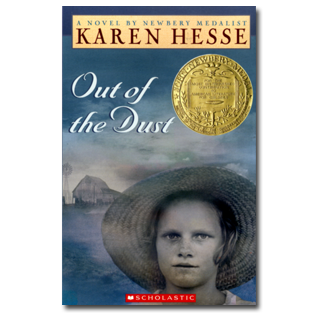Technically, this also covers another one of those poetry bits and pieces.
Narrative Poetry: A poem that tells a story.
In my days as a teacher I ran into plenty of enthusiasts for Edgar Allan Poe's poetry -- especially "Annabel Lee" and "The Raven". But book-length narrative poems are few and far between. You could go back and dig up Elizabeth Barrett Browning's Aurora Leigh. But it probably won't get your teen excited.
I think I have a solution. Two actually.
Karen Hesse, Out of the Dust is a fabulous story told from the point of view of a teenage girl living in the Oklahoma panhandle during the Great Depression and in the middle of the Dust Bowl.
But despite the despair that the story begins in, and continues in, there is hope at the end of the tunnel. And in these economic times, I found that reading it again was inspiring in way.
The story is told in poetry -- but you hardly notice it. And that's the key to good narrative poetry. Well, good poetry at all. It flows so much that you simply read and soak it in. But it also has moments where as you read you see how the form and the technique of the written poem adds to the feeling that is created.
My favorite poems (but you can't read them out of the context of the novel now!) are "The Accident", "Hope", and "The Dream". But they're all good. Hey, they make me cry. Ok that's not necessarily a mark of genius -- I'm a fairly leaky person!
Secondly, if you want something for that middle school crowd, and boys-who-don't-like-poetry especially, Sharon Creech's Love That Dog is a cute read, perfect for National Poetry Month.
Those are my favorites for narrative poetry. Oh, and another thing to entice your teenager with? They're short. Enjoy!
Secondly, if you want something for that middle school crowd, and boys-who-don't-like-poetry especially, Sharon Creech's Love That Dog is a cute read, perfect for National Poetry Month.
Take a look at her site on the book because she not only talks about the book but about the inspiration behind it in a poem from Walter Dean Myers.
And then I will say this -- the main character is a boy and he expresses a typical boy's interest in poetry in the beginning of the book. His voice is so clear that I can practically hear this kid sitting in my classroom complaining about poetry! Also, he references several well-known poems that I think would be great to read with the book and have kids respond to them as well. But he comes around. As I wish they all would! It's a fun fun read -- particularly for me as a teacher. But it is really easy to relate to -- especially to kids who don't like poetry (and unfortunately, that seems to be most of them!).
Those are my favorites for narrative poetry. Oh, and another thing to entice your teenager with? They're short. Enjoy!

